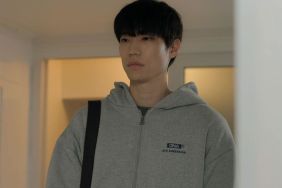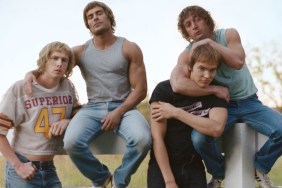Ever since winning an Oscar for his very first movie American Beauty, director Sam Mendes has been revered as an actor’s director, whether it’s on the three movies that followed or with his prolific work on stage.
His fifth movie, Away We Go, is as much a departure as it is a return to form. It’s Mendes’ first movie based on an original screenplay since American Beauty, but it’s also a departure because it’s really nothing like his previous four movies, especially the dark ’60s drama Revolutionary Road. In fact, you might not even realize Mendes directed it unless someone told you, even though there are certainly a few familiar themes.
Based on the screenplay by authors Dave Eggers and Vendela Vida, it stars John Krasinski from “The Office” and Maya Rudolph, formerly of “Saturday Night Live,” as a young couple having their first child, who decide to take a road trip to find the perfect place to bring up the baby. Over the next few weeks, they travel across the country visiting their various relatives and acquaintances, all of them even more dysfunctional than the next. Playing these eccentric characters are a hilarious ensemble cast including Alison Janney, Maggie Gyllenhaal, Josh Hamilton and more. If you enjoy the type of down-to-earth character-driven humor of movies like Lars and the Real Girl, Dan in Real Life or even something like Knocked Up, you should find a lot to like or love about Mendes’ latest.
Mendes has long been one of the filmmakers this writer has always wanted to interview, and ComingSoon.net had a terrific extended phone conversation with Mr. Mendes a few weeks back. Here it is:
ComingSoon.net: I loved the movie, but I think if I saw this movie and someone didn’t tell me it was a Sam Mendes movie, I would not have figured that out.
Sam Mendes: Good.
CS: It is good, yeah. I was curious how that worked out, because you did it back to back with “Revolutionary Road” and it’s so different. How were you able to switch heads so fast to get into this one?
Mendes: Well, for me it was an opportunity to let off a little bit of steam after “Revolutionary Road,” but also I really tried hard to approach it in a completely different way and sort of shock myself into another way of working a little bit. I was very meticulous and detailed on “Revolutionary Road”, but I wanted to make a movie that was looser and more fun and actually it would’ve been more difficult if it had been the other way around if I had gone from this movie to “Revolutionary Road.” So for me, here it was a question of letting go, of the need to express every single moment and thread the needle, to work sort of back to the level of psychological detail. It’s nice to just be free and to have fun. But more than that in a way. I’m very proud of “Revolutionary Road,” but I don’t think about the world like Richard Yates. I’m not the Yatesian experience. I don’t think men and women are destined to never be together or be doomed. For me, the philosophy of this movie is much closer to what I actually do think about the world.
CS: That’s nice to know.
Mendes: Yeah, exactly. Well, it’s a hopeful movie and I’m hopeful. I don’t sit around thinking, “We’re all doomed,” so in that way it was much easier to get into the headspace of the film than it was “Revolutionary Road.”
CS: Now, it’s funny because having two movies from you within a year is such a rarity…
Mendes: (Laughs) Yeah, I know.
CS: In the past, you’ve generally been doing theater in between your movies. I was wondering about your time at the Donmar Theater; were you doing plays like this, back-to-back, and was it a lot like this where you had to switch gears between them?
Mendes: You mean with plays? Yeah, absolutely. I’m very used to going from one to the other and I’ve always found that when I did that, the second production was better, because I operated more on instinct and you become very instinctive very fast; you make decisions very quickly. There’s something about doing a movie or a play after a year’s gap or a two-year gap, it takes you a while to build up speed again, to kind of get back in the groove. But when you go from one to the other, you’re already in the groove somehow. So weirdly, even though you asked the question, “How do I get from one headspace to the other?” I’ve found it easier this way. Also, you don’t over think things and you don’t obsess. You just do it and you operate from your gut rather than from your head. I didn’t storyboard it. I do my little sort of sketches in the early stages of pre-production, but I didn’t over think it.

CS: I’m going to jump ahead to a question I was going to ask later. When you did your first movie “American Beauty,” it won so many Oscars and other awards, so what it was like going to your second movie “Road to Perdition” and switching heads like that?
Mendes: Well, it’s a difficult second album, isn’t it? I made the decision to do something quite quickly after “American Beauty” because I thought, again I could over think it and obsess and I was very pleased I could make a totally different kind of movie. I spend a lot of time being very determined to not to always work in the same style, to work in different styles and to challenge myself. Even though my first movie was very successful, I was still very green in many ways and I wanted to explore different ways of making movies and different ways of telling stories and I feel like that continues through into this movie. I’ve always loved the work of Hal Ashby and it’s my way of making a Hal Ashby styled movie. I’ve always wanted to make a movie that has that kind of simplicity of style, that deceptive… Look, I wouldn’t make claims, that it’s as good as the great Hal Ashby movies, but it certainly is influenced by him.
CS: There definitely seems to a resurgence of interest in Hal Ashby and his movies from many filmmakers I’ve recently spoken to. Have you noticed that?
Mendes: Well, definitely. You look around and a lot of very good filmmakers from Cameron Crowe to Spike Jones to Judd Apatow are influenced by him. He’s a great moviemaker and there’s something so honest about his style. There’s a sort of serenity at the center of his movies which is very striking I think. Also, because there’s a light somehow in all of the films, a spirit of humanity and lightness of touch and a joy there that I felt totally in what Dave and Vendela and I were talking about when we were putting the movie together.
CS: How long ago did you read this script and were you working on something else when you got it?
Mendes: Yeah, I had wrapped “Revolutionary Road” and I read it just after I finished shooting. I told Dave I wanted to do it almost immediately. I didn’t really know when I was going to do it, but then it all happened very fast. I sort of put it together a little bit like doing a play. We were very lucky in that Focus basically said cast whomever you want, they didn’t say, “We’ll only make this movie with the following six actors.” They just said, “You just cast who you think is best for the roles,” so it was much easier for me to put it together, much quicker than the norm.
CS: Was it hard finding actors to play Burt and Verona? It would seem like you could go in a lot of different directions and John and Maya, they’re great together. I don’t think any other director would really ever think of putting those two together.
Mendes: No, on the surface, it’s a very eccentric partnership. When you meet them they’re very, very alike and they got on incredibly well and their humor is identical, so that’s very, very helpful. I’d worked with John in “Jarhead” – he did four lines for me and that was before he did “The Office.” I had a feeling then he was a special actor. Maya, I’ve always admired on “Saturday Night Live”, and actually it was Dave and Vendela who mentioned the idea of Maya to me early. I said, “Well, that’s fabulous, but is she an actress? There’s nothing to tell me that she is.” She came in and we met and she just read, and the moment she started to read I thought, “Oh, well that’s it then. She should play the part.” I mean, it really was that clear. Then it was a question of getting them in sync with each other because John, who is used to playing the sort of naturalistic, least high-energy character in “The Office,” was playing the high energy character in this movie. Maya, who is used to doing the very high definition comedy performances on TV was playing the more centered and rooted part of the couple. So they had to do sort of the opposite of what they normally do to some degree in order for the film to work. So I needed to rehearse with them, and we rehearsed for a couple of weeks. By the end of two weeks, they were a couple, but it was really about keeping them relaxed, letting them improvise a little bit, keeping them loose, keeping them in control, feeling like they owned the characters rather than they were fulfilling a brief from me or Dave. The moment they brought the characters to themselves, it started to really work. I think the movie would be nothing without them. I think it’s a very romantic film, but partly because it doesn’t try to be romantic. (laughs) It’s very rare that you see a couple’s secret world, their secret language put on screen and I hope that that’s there.
CS: Did you guys change the script or any of the background of the characters once they came on board?
Mendes: No, they’re playing the characters as written. The descriptions in the screenplay are exactly the characters written by Dave and Vendela. It’s no different. They didn’t suddenly become John and Maya. They are playing Burt and Verona and those lives are written by somebody else and those distinct characters were conceived by the writers.

CS: You talked earlier about doing different things. A lot of directors use the same actors and casts over and over again once they find their comfort zone. In this, you have a few people you’ve worked with before like Allison Janney, John. When you cast a script like this with so many different characters, do you try to find people you know or generally try to find people you haven’t worked with before?
Mendes: I always cast the best people for the parts, really, or I try to. I don’t think, “Ooo, how can I get such and such into the movie?” I start from the position, “Who of the actors I know or don’t know are going to nail these roles?” The big surprises for me are always the unknowns. I never knew going into “Revolutionary Road” that Michael Shannon was going to play John Givings, for example. I didn’t know any of the kids in “American Beauty” before I started auditioning. There were a number of people in this movie, Chris Messina for example, Jim Gaffigan or Josh Hamilton playing Roderick, who I barely knew before I started shooting, all of whom who came and blew me away when they read for the part or when I met them. Look, obviously, there’s barely been an actor that I’ve worked that I don’t like to be honest with you, so most of the actors I’ve worked with I’d be happy to work with again. But my starting point is always, “Who is going to be the best actor for the role as written?” and to try and get in the writer’s head, particularly when it’s an original screenplay, and to find the person who’s going to bring it to life with the greatest clarity.
CS: I think people who see this will really fall in love with a lot of the satellite characters, and will probably hope for some callbacks but we never see any more of these people. Was it hard just having them pop in for a bit and then not come back later?
Mendes: That’s the thing. The first rule of the road movie is the people that you meet on the way, you should leave the audience wanting to see more of them. That’s good that you felt that.
You’re getting the little oblique insights into their lives. My job was to make sure that we felt like spies in their lives, and we’re visiting a tiny little section of an existing life. It’s very important that we believe that people were real and they lived in those places and that those relationships existed ten years before we’re allowed to spend our brief ten minutes with them in the movie. I think that one of the pleasures of the road movie and the genre is the simplicity of it. It’s just a nice good old-fashioned story. “I’m going on the road. I’m going to look for something. How am I going to find it and who do I meet on the way?” You really feel the audience enjoying that simple storytelling aspect of the film and one of the pleasures is you know you’re going to meet a load of different people. I think that for me, in the editing process, a lot of it was to do with keeping the movie moving forward and leaving the couple they meet just a beat before you expect it.
CS: How did you work out the rehearsal process, because you obviously have John and Maya in every scene, but everyone else just shows up for a little bit. How did that work? Did they just come in to rehearse for a day or so?
Mendes: Yeah, even if all we’ve done is sit around for three hours and read the scene, I think it’s important. Think of a movie like this where you have to convince an audience that these people are not just playing in one scene, but you’re having a little snapshot of their lives, that you meet them early and rehearse with them, so yeah, we did a minimum of a day with everybody.
CS: One thing I’ve always liked about your work is the way you’ve explored dysfunctional families over the years. I think “Jarhead” may be the one movie so far that doesn’t have any kind of dysfunctional family connections.
Mendes: It’s not true. I cut it out of the movie, but he’s from a really dysfunctional family. (Laughs) He’s beaten by his father and all that sort of stuff, but yes, absolutely, in the movie, it isn’t really, but it is an adhoc family that he finds.
CS: It’s hilarious that it’s almost like an endless source of humor and pathos. Even Michael Shannon in “Revolutionary Road” and the relationship with his parents. Could you talk about that a little bit?
Mendes: Yeah, you don’t really know why you’re drawn to these things; you don’t choose your taste. All I can say is that whenever I decide to make a movie, the basis of that decision always has to be that you feel that you’re the best to tell the story, because obviously, if you’re not the best person, someone else should be doing it. I feel very comfortable on that territory. I’m of the Bergman school of beliefs that there’s nothing ever gonna be more interesting than the human face, and the possibility of human beings will never run out in terms of dramatic storytelling. I don’t know, I’m just drawn to stories about human beings and about families in particular. You know, I come from a broken home and obviously some part of me is very attracted to telling stories about those families, about what family is, how families can work and how it could fail. It seems to me to be most of our lives, to a greater or lesser degree, we spend struggling with that either as a child of your parents or as parents of your children. I think that it’s also, as you see in this movie, it’s source for a lot of comedy and joy, too.

CS: Something that differentiates this movie from your other movies is that you don’t have an actual score, instead using the songs of Alexi Murdoch. Was that also a very early decision?
Mendes: It was, yeah. I knew I wasn’t going to score this movie in the traditional way. I think that one of my great creative partnerships over the years has been with Tom Newman, but it’s always good to have a break. Also, I felt like that the melancholy in the movie should be expressed in song form and I felt like if I could get the two running concurrently, the music and the landscape could somehow be infused with melancholy at the same time, if we were playing these quite heightened funny scenes interspersed with a sense of the landscape, the world passing. I thought those two things needed to go hand in hand. I was thinking about using Nick Drake and that sort of thing, but I felt Nick Drake is 30 years old now and is there that kind of someone who has that lyricism and that melancholy in his work and a slightly folk element, so it’s not too sweet. We found Alexi Murdoch, he’s only made one album, but every time I put a song up against a movie it seemed to stick. Before I knew it, I was scoring the whole film with his songs, and then I brought him in and he wrote three other songs for the movie and extended certain numbers and added instrumental bits on the theme and stuff like that. That’s how we worked on it. It was really pleasurable and I think that that’s a huge part of the tone of the film is him.
CS: It really worked well, and I’m generally a big fan of the scores of your past movies too.
Mendes: Oh, thank you and so am I. I mean, Tom is a genius and I have absolutely no doubt I’ll work together with him again, but I just didn’t feel this movie required it. I think again, it’s having this strength. It’s a bit like the question – by the way, these are great questions, Ed. Thank you for asking these questions, that’s not always the case! I think it’s the same as the question you asked about me not using the same actors, and not existing in my comfort zone. It’s the same thing. Whenever I get comfortable with something, my instinct is to not abuse that comfort, to change it, to shut myself out, and that’s what I did on this.
CS: Now, that you’ve finished back-to-back movies, do you have any idea what you’re doing next? I know you’re attached to a number of movies, but do you just go back and do stuff on stage for a bit or jump into one of those other movies?
Mendes: I’ve started this company, The Bridge Project–we did “The Cherry Orchard” and “A Winter’s Tale”–and that’s touring the world at the moment and about to go to London. I’ll do the same thing next year with two plays with a new company of actors, and then I’ll do a movie. I guess next spring I’ll start thinking about what I’m doing ’cause I’ve been so busy with most movies and the plays I haven’t really gotten to the point where I’ve developed anything that’s ready to go. But it won’t be long and it’ll be something that will sort of jump up and say, “Direct me.” (chuckles)
CS: I’m personally very interested in the idea of you doing “Preacher” because I was a big fan of “Road to Perdition” and I’m a fan of those comics as well. How’s that been progressing in terms of John August developing the script?
Mendes: I think it’s an incredible piece of material and I’m very hopeful about John’s script, so let’s keep our fingers crossed.
CS: Do you have any idea if you’re going to try and condense the entire series into one movie or are you going to jump around use portions of it?
Mendes: Oh, he wouldn’t do the entire series in one movie. It would be impossible to do all nine volumes in one movie, that would be one long movie, and it wouldn’t do justice of it. It will not attempt to do all of it, but there’s so much wonderful stuff that I wouldn’t know what to leave out.
CS: I think it’s pretty cool, since it would tap into some of the things you have done over the years – it has dark humor and interesting things to work with. As far as the theater stuff, do you generally go along with the plays whenever they tour, at least to start off?
Mendes: No, obviously we rehearse in New York and that’s where I live, then I’ll go to London. Then I tend to go on maybe one or two dates on the road this year I went to Madrid and I’ll go to Greece with them as well. So I like to stay in touch with them.
Away We Go opens in New York and L.A. on Friday, June 5 and then expands elsewhere over the rest of the summer. Look for our exclusive interviews with actor John Krasinski and the writers of the film next week and beyond.









